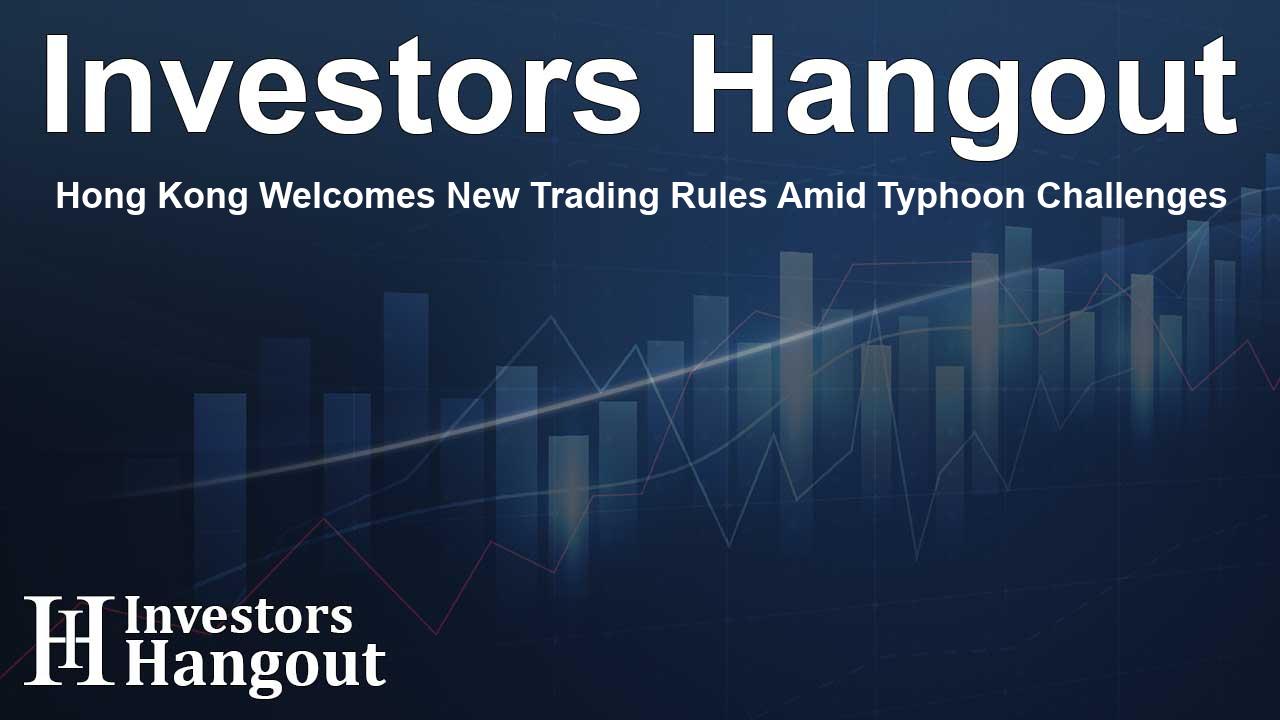Hong Kong Welcomes New Trading Rules Amid Typhoon Challenges

Adapting to Typhoon Challenges in Hong Kong's Stock Market
The bustling financial hub of Hong Kong has taken a significant step forward with its stock market by announcing a notable change aimed at navigating the challenges posed by severe weather events. As of September 23, a new rule will allow the Hong Kong Stock Exchange to remain open even during typhoons and other adverse weather conditions. This move marks a pivotal moment for the financial sector, aligning Hong Kong more closely with global trading practices.
Significance of the New Trading Rules
The decision comes in the wake of Super Typhoon Yagi's near-direct hit on the city. On September 5, the storm wreaked havoc, prompting the closure of the stock exchange due to existing regulations. This incident highlighted the disruptions that typhoons can cause, as the exchange has had to shut down operations entirely on 12 separate occasions since 2018, including four times last year alone.
Market Insights and Reactions
Market experts, including Edmond Hui, CEO of Bright Smart Securities, believe that the new rules will enhance the exchange's competitiveness. The ability to trade even in poor weather conditions is expected to bolster investor confidence and operational stability. Most brokerage firms have already prepared for this transition, with test runs demonstrating a high readiness among market participants.
How Typhoons Have Impacted Trading
The historical practice of closing the exchange during typhoons stems from a time when trading was predominantly conducted in person. This antiquated regulation often frustrated investors who viewed such closures as unnecessary. The shift to allowing trading during severe weather conditions aims to maintain operational consistency and avoid any potential loss in trading volume.
Thinking Beyond Weather: Attracting More Investors
Analysts believe that while the new rules will positively impact trading dynamics, they will likely have a limited effect on overall trading volumes. Factors such as the recent slowdown in China's post-pandemic recovery and the ongoing regulatory scrutiny over technology stocks have presented more significant challenges to investor confidence than temporary trading suspensions. To attract a diverse array of investors, experts suggest that lowering transaction costs and enhancing the overall trading environment are critical steps.
Looking Ahead: Opportunities for Growth
As the Hong Kong government continues to explore measures to improve stock market liquidity, there are discussions regarding the possibility of lowering the minimum trade amounts, which could appeal to more retail investors. Current regulations require a minimum purchase of a lot, sometimes costing investors a substantial amount. Simplifying this process may allow for greater access to the market and encourage participation.
Kenny Wen, head of investment strategy at KGI Asia, identified the need to optimize the market structure to foster greater interest from both local and international traders. With a growing appetite for innovative investment opportunities, Hong Kong aims to remain relevant in a rapidly evolving financial landscape.
Final Thoughts on Hong Kong's Financial Future
In conclusion, the evolving regulations surrounding trading during severe weather in Hong Kong signify a broader commitment to enhancing the market’s global competitiveness. As the exchange adapts to changing circumstances, it is poised to improve its offerings and align more closely with international standards. This will not only help retain existing investors but also attract new ones seeking opportunities in the region.
Frequently Asked Questions
What are the new trading rules for the Hong Kong Stock Exchange?
The new rules will allow the stock market to remain open during severe weather events, including typhoons, starting September 23.
How often has the Hong Kong stock market closed due to bad weather?
Since 2018, the market has been closed on 12 occasions due to severe weather, including four closures in a single year.
What impact do experts believe the new rules will have on trading volumes?
Experts suggest the new rules will have a limited effect on overall trading volumes, though they may help enhance operational consistency and investor confidence.
What strategies are being proposed to attract more investors?
Proposals include lowering transaction costs, reducing minimum trade amounts, and improving market liquidity to make it more attractive for retail investors.
How does Hong Kong's new policy compare to other major global exchanges?
Unlike Hong Kong, other global exchanges such as those in New York and Tokyo remain open during adverse weather events, reflecting a more consistent trading approach.
About The Author
Contact Evelyn Baker privately here. Or send an email with ATTN: Evelyn Baker as the subject to contact@investorshangout.com.
About Investors Hangout
Investors Hangout is a leading online stock forum for financial discussion and learning, offering a wide range of free tools and resources. It draws in traders of all levels, who exchange market knowledge, investigate trading tactics, and keep an eye on industry developments in real time. Featuring financial articles, stock message boards, quotes, charts, company profiles, and live news updates. Through cooperative learning and a wealth of informational resources, it helps users from novices creating their first portfolios to experts honing their techniques. Join Investors Hangout today: https://investorshangout.com/
The content of this article is based on factual, publicly available information and does not represent legal, financial, or investment advice. Investors Hangout does not offer financial advice, and the author is not a licensed financial advisor. Consult a qualified advisor before making any financial or investment decisions based on this article. This article should not be considered advice to purchase, sell, or hold any securities or other investments. If any of the material provided here is inaccurate, please contact us for corrections.
